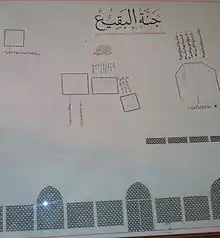Aqeel ibn Abi Talib
Aqeel ibn Abi Talib (Arabic: عَقِيل ٱبْن أَبِي طَالِب, ʿAqīl ibn ʾAbī Ṭālib) was a companion and first cousin of the Islamic prophet Muhammad. He was known by the kunya Abu Yazid. He is also said to be the common ancestor of the Somali clan such as the Darod clan. [1]
| Aqeel ibn Abi Talib عَقِيل ٱبْن أَبِي طَالِب | |||||
|---|---|---|---|---|---|
 Arabic Calligraphy Of Aqeel Ibn Abi Talib's Name | |||||
| Born | 581 CE | ||||
| Burial | Jannat al-Baqi | ||||
| Spouses | Fatima bint Al-Walid | ||||
| |||||
| Tribe | Quraysh (Banu Hashim) | ||||
| Father | Abu Talib ibn 'Abd al-Muttalib | ||||
| Mother | Fatimah bint Asad | ||||
| Religion | Islam | ||||
| Part of a series on |
| Ali |
|---|
 |
|
and_Akil_bin_abi_Talib.jpg.webp)

| Part of a series on |
| Islam |
|---|
 |
|
Early life
He was born c. 581 CE, the second son of Abu Talib and Fatimah bint Asad; hence he was a brother of Ali. He was said to be an expert in genealogy.[2]
He married Fatima bint Al-Walid from the Abdshams clan of the Quraysh.[3] He had seven sons: Muhammad, Muslim, Ja'far, Musa, Abdul Rahman, Abdullah and Abu Saeed; and a daughter, Ramla.
At Badr
After Muhammad departed from Mecca, Aqeel sold the houses of his Muslim relatives among the inhabitants of the city.[4]
He fought on the side of the polytheists at the Battle of Badr, where he was taken prisoner.[5] Muhammad is reported to have told his companions on the Day of Badr: "Indeed I am aware that men from Banu Hashim, and others also, have been brought out under compulsion with no wish to fight us. If any of you encounters one from Banu Hashim then do not kill him" [6] Umar said that he should be handed over to Ali to have his head cut off; but Muhammad approved of Abu Bakr's opinion that he should be released on ransom.[7] Since Aqeel had no money, he had to be redeemed by his uncle Abbas for 500 dinars or 40 ounces of gold.[8][9] When Muhammad told him that Abu Jahl had been killed, Aqeel conceded that nobody would now challenge Muhammad's authority: "Either people will be affected by your words, or you will dominate them by force."[10]
Conversion to Islam
Aqeel emigrated to Medina in mid-629, a year after Khaybar.[11] Aqeel and his children, due to their close relationship with Muhammad, were forbidden to receive anything from the alms tax.[12]
He fought in the Battle of Mu'tah.[11] It is said that soon after this, he fell ill and "was not mentioned at" the conquest of Mecca, the ambush at Hunayn or the siege of Ta'if.[13] However, an alternative tradition indicates that he did in fact fight at Hunayn. When his wife asked him what plunder he had brought back from this battle, he replied: "This needle. You can sew your garments with it," and he gave her his bloodstained sword. Later Muhammad ordered anyone who had taken anything from the plunder to return it. Aqeel told Fatima, "By Allah, I think your needle is gone!" and threw his sword into the plunder.[14]
After Muhammad
Aqeel donated a carpet to the mosque in Medina. On Fridays it was spread out up the west wall. When the shadow of the wall covered the whole carpet, Umar knew it was time to come out for the midday prayer.[15]
Aqeel was the fourth husband of Fatima, a sister of Hind bint Utbah. She was a wealthy woman who paid Aqeel to manage her property as Aqeel was a wealthy and successful merchant. she often asked him about her father and uncle,[16] who had been killed by the Muslim army.[17] Aqeel once told her that they were in Hell, and their quarrel was so severe that Uthman assigned Muawiyah and Abd Allah ibn Abbas to mediate between them.[18]
Aqeel was the man who found Umm ul-Banin to marry Ali.
In old age he became blind. He died in the caliphate of Muawiyah I,[19] at the age of 96.
Legacy
Descendants of Aqeel are numerous and spread out across Hejaz, Yemen, parts of Oman and Somalia. One of them is Darod, who is considered to be the Father of the Darod tribe that are found in Yemen, Oman, Somalia, Egypt, Saudi Arabia and Sudan. The shrine of Imam Saad bin Aqil' who is a descendant is located in Tal Afar, Iraq.
See also
- Ali ibn Abi Talib
- Ja'far ibn Abi Talib
- Talib ibn Abi Talib
- Hasan ibn Ali
- Husayn ibn Ali
- Sahaba
- Muslim ibn Aqeel
- Ruqayyah bint Ali (The daughter in law of Aqeel ibn Abi Talib)
- Battle of Mu'tah
References
- Muhammad ibn Saad. Kitab al-Tabaqat al-Kabir. Translated by Haq, S. M. (1967). Ibn Sa'd's Kitab al-Tabaqat al-Kabir, Volume I Parts I & II, p. 135. Delhi: Kitab Bhavan.
- Ibn Saad/Haq p. 135.
- Muhammad ibn Umar al-Waqidi. Kitab al-Maghazi. Translated by Faizer, R. (2011). The Life of Muhammad, p. 450. London & New York: Routledge.
- Waqidi/Faizer p. 408.
- Muhammad ibn Ishaq. Sirat Rasul Allah. Translated by Guillaume, A. (1955). The Life of Muhammad, p. 338. Oxford: Oxford University Press.
- ibn Hisham, "Sirat ibn Hisham", vol.2, p. 271. Beirut: Dar al-Kitab al-Arabi (1990)
- Muslim 19:4360.
- Ibn Ishaq/Guillaume pp. 312-313.
- Muhammad ibn Jarir al-Tabari. Tarikh al-Rusul wa'l-Muluk. Translated by Landau-Tasseron, E. (1998). Volume 39: Biographies of the Prophet's Companions and Their Successors, p. 60. Albany: State University of New York Press.
- Tabari/Landau-Tasseron p. 60.
- Tabari/Landau Tasseron p. 60.
- Muslim 31:5920.
- Tabari/Landau Tasseron pp. 60-61.
- Waqidi/Faizer p. 450.
- Malik ibn Anas. Al-Muwatta 1:13.
- Muhammad ibn Saad. Kitab al-Tabaqat al-Kabir vol. 8. Translated by Bewley, A. (1995). The Women of Madina, p. 168. London: Ta-Ha Publishers.
- Ibn Ishaq/Guillaume p. 337.
- Ibn Saad/Bewley p. 168.
- Tabari/Landau Tasseron p. 61.